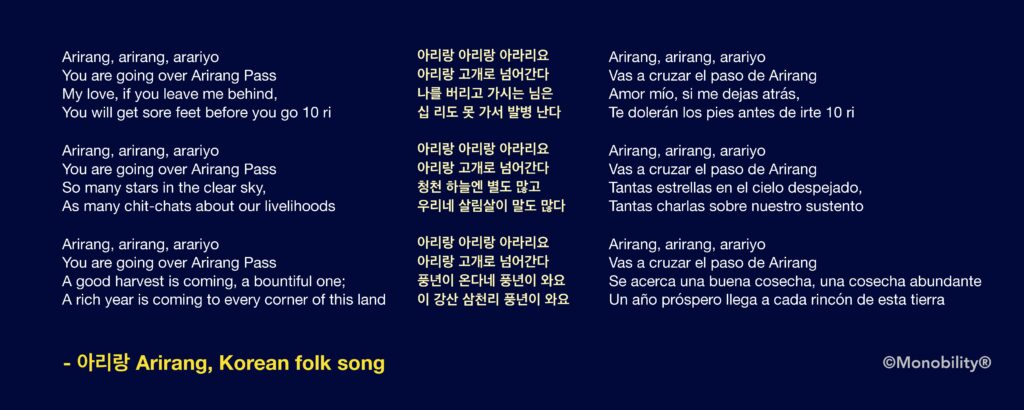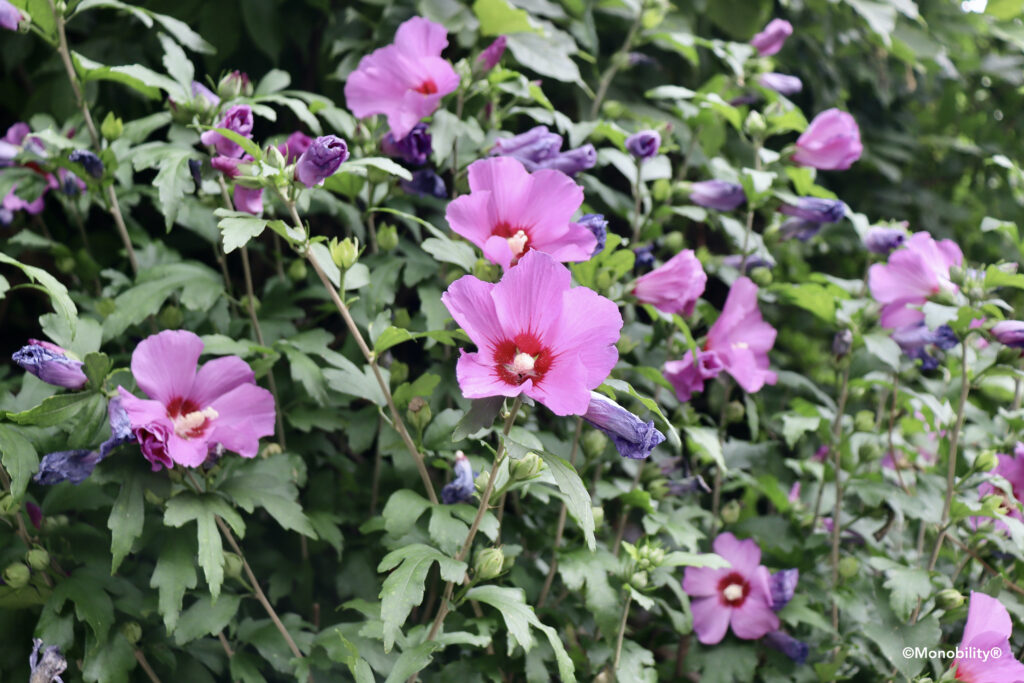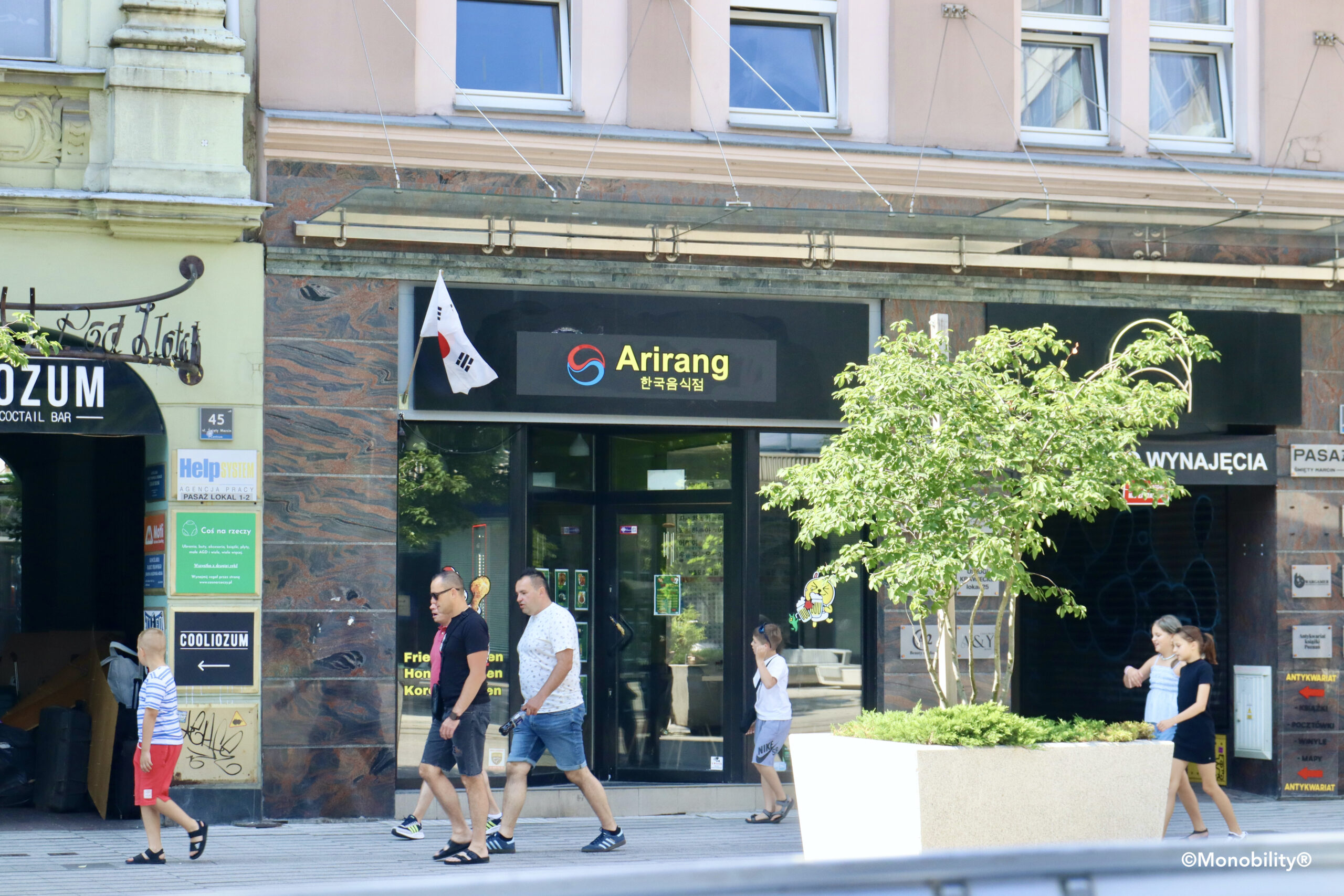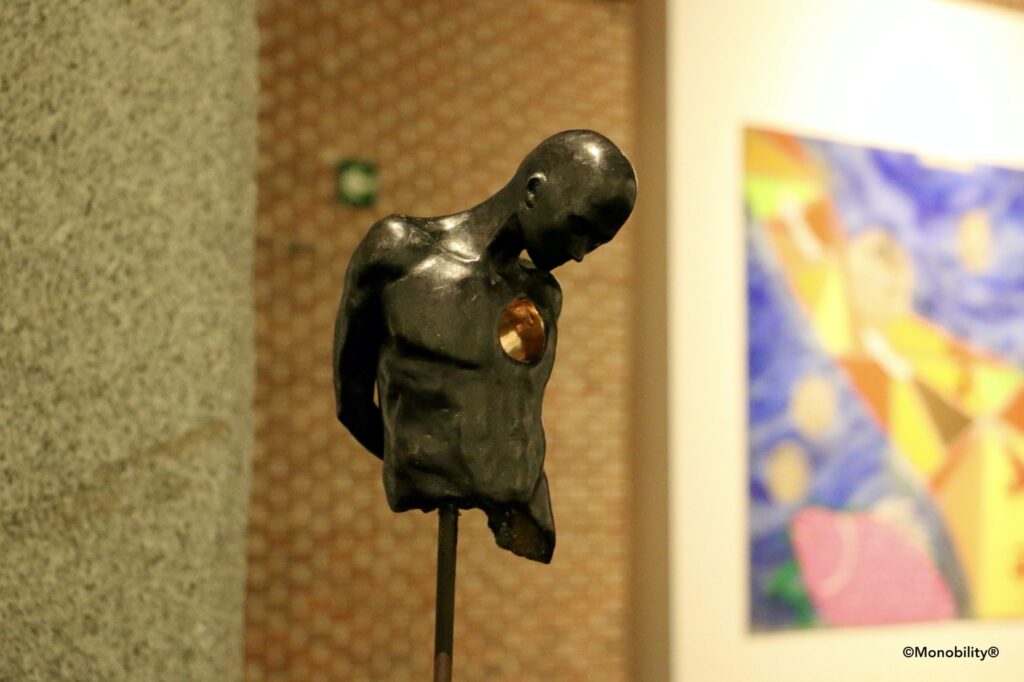How would you tell whether someone is a real Korean or a fake? It is quite simple. Tell the person to sing Arirang. Or better yet, learn its lyrics from this post and the video specially designed for you, sing it to the person in Korean, and watch their emotional reaction. Arirang is one little folk song that resonates so profoundly with all Koreans that anyone who doesn’t know it shouldn’t be called a real Korean, or a true Koreanist — someone who studies and loves Korean culture. Estimated to be over 600 years old, the song’s 60 different regional variations and their use in times of national significance, e.g., the independence movement during 35 years of the Japanese occupation of Korea (1910 – 1945), and the Korean War (1950 – 1953), further solidified its place as a powerful symbol of Korean identity. No wonder it took me four years since the launch of Monobility® to translate a song of such historical and emotional importance.
Once you listen to the second and third verses near the end of the video, you will find that with its beautifully haunting melody, the folksy lyrics are all about enduring love, childlike innocence, resilience, and optimism. This song is not about grandiose, pompous nationalism. Rather, in humble, placid Korean words, it sings of the most ordinary life experiences and those universal values that can melt into human sentiments.

Arirang: The meaning of this word is unknown. Some etymologists suggest that “ari” meant “beautiful” and “rang” meant “beloved one” in ancient Korean, thus translating Arirang into “my beloved one.”
고개 a mountain pass
넘어가다 to go over
나를 me [ accusative case with -을/를 particle ]
버리다 to throw away, to abandon [ 버리고 = verb stem +고 = …, and ]
가다 to go [ with honorific 시 => 가시다; 가시는 = verb stem + 은/는 relative clause ( … who go/goes ) ]
님 a loved one; an honorific to put at the end of names and titles [ respectful ]
십 10 [ sino-Korean ]
리* ancient unit of distance [ about 0.4 km = 400 m; 10 리 = 4 km ]
도 even, also/too [ not … even in a negative sentence; too/also in a positive sentence ]
못 not [ 못 + verb = can not … ]
-서 and then … [ verb stem +서, a particle meaning a result = … and then, ]
발 foot/feet
병 disease/sickness [ 발병 sore feet; archaic; 병 나다 to get sick/ill ]
청천 clear sky
하늘 sky [ 청천 하늘 clear sky (duplication, idiomatic) ]
별 star(s)
많다 many [ 많고 adjective stem + 고 = …, and ]
우리네 our
살림살이 household, livelihood; household goods
말 talks, words [ 말도 많다 too much chit-chat; to be talkative ]
풍년 a bountiful year ( bumper crop year )
오다 to come [ 온다네 will come [ verb stem +ㄴ/는다네 1) conjecture; 2) quotation “They say that … will “ ]
와요 present tense (impending future tense) conjugation of 오다; -요 normal respectful register
강산 land, country [ literally, “rivers and mountains” ]
삼천리 3000 ri [ about 1200 km = ~ the length of the Korean peninsula from north to south; 삼천리 강산 = Korean peninsula (idiomatic expression for “the land of Korea” ) ]
Level A1: How do you write Arirang in Korean? As a beginner, you might want to first learn the basic 한글 in:
Level B1: What two lines do you hear in Korean, marked as [ Level B1 ] in the video, correspond to the following translations? Please study the grammar presented above and refer to the explanation on the word-for-word translation.
- My love, if you leave me behind,
- You will get sore feet before you go 10 ri
Level C1: What exactly do the above two lines mean, from the perspective of traditional Korean mentality embodied in the semantics of the lyrics?
a. 네가 감히 날 버리고 가면 난 네 발이 아프길 기도할게. 이건 내 마지막 저주야, 저주!
b. 사랑하는 이여, 나를 혼자 두고 떠나지 말아요. 내 그리움으로 당신 발이 아파져서 곧 내게 돌아오게 될 거예요. 제발 떠나지 말아요.
c. 그대여, 내가 그토록 싫어서 날 두고 떠난다면, 너무 빨리 가지 마세요. 그러다가 발에 병이라도 나면 더 이상 가지 못 할 테니까요.
d. 야! 이제 날 배반하고 떠나니? 넌 10 리도 못 가서 발목을 삘걸. 난 너뿐만 아니라 네 가족, 친구들 모두 쫓아가서 복수할 거다. 기대해.
e. 그대가 나를 두고 혼자 떠나면 그 무거운 짐 때문에 곧 발이 아파질 거예요. 여행은 둘이서 함께 가야 쉬운 법이에요.
Monobility® Group



